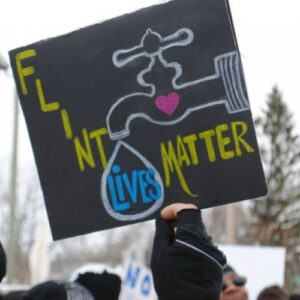Seven years. 2,555 days.
That’s how long the people in my hometown of Flint, Michigan have had poisoned water coming out of their taps. There is now an entire generation of children who have never taken a bath. My friends and neighbors still develop skin rashes and see their hair fall out when they wash their hands or bathe in our lead-poisoned water. For seven years, we’ve been dealing with the chronic health effects of lead in our water and the financial burden of paying for poisoned water we can’t even drink.
The situation has only intensified over the COVID-19 pandemic — while the Centers for Disease Control and Prevention states that frequent handwashing is critical to stop the spread of coronavirus, we still have unsafe and unaffordable water coming from our taps. And to make the situation even worse, the state moratorium on water shutoffs due to non-payment just expired on March 31, putting many people in the state at risk of losing their access to any water in their houses at all. A report released last month revealed the startling fact that a national moratorium on water shutoffs could have prevented almost half a million COVID-19 infections and saved more than 9,000 lives in the United States over the past year. When looking at these facts, it’s little wonder that Michigan has the highest number of new cases in the country.
Flint Rising, the organization I lead, grew out of this water crisis. Since we began, we have built a movement demanding that the Michigan legislature replace all damaged water services lines, reimburse all water bills back to April of 2014, and fund long-term health and education services for people in Flint. And, during the pandemic, we’ve pushed hard to stop the unjust practice of utility shutoffs and advocate for long-term relief for Michiganders and more.
But we can’t do it without a broad base of support, the continued attention to this crisis from people across the country, and the resources it takes to continue building this movement in Flint. And that’s why I’m asking you to donate today. Half of your gift will go towards powering my team’s fight for justice in Flint, and the other half will power Corporate Accountability’s global campaign challenging corporate control of water in Michigan and around the world.
Seven years ago today, Flint’s water supply was switched to the contaminated Flint River to save money. The decision was made by an unelected official who was appointed by the state through a racist ‘emergency manager’ law. It didn’t take long for us to see that something was terribly wrong. Now we pay some of the highest rates in the country for our water bills — for water we can’t drink, bathe, or clean with.
It’s always been unconscionable that we’ve gone this long without clean water. But the COVID-19 pandemic has made this burden even harder, and highlighted just how much our lives depend on access to clean, safe water.
Over the last few years, Flint Rising has partnered with Corporate Accountability to elevate the Flint water crisis to the national consciousness. We’ve traveled around the globe, from Washington to Los Angeles to Lagos, Nigeria, to share our stories and demand clean, and affordable water for all. And we’ve strengthened a powerful movement for water justice in Flint and beyond.
Nayyirah Shariff (they/them/theirs) is the Executive Director of Flint Rising.




